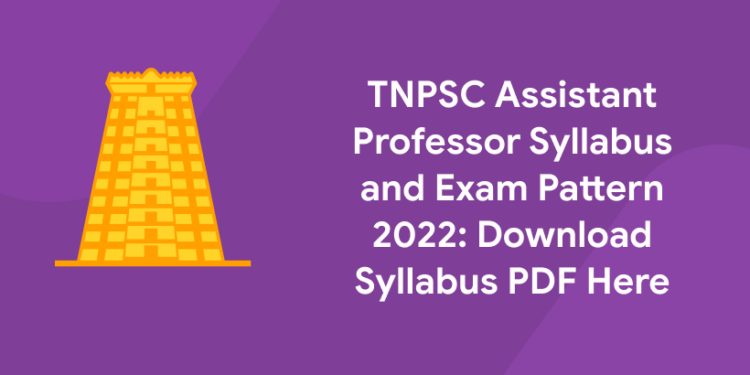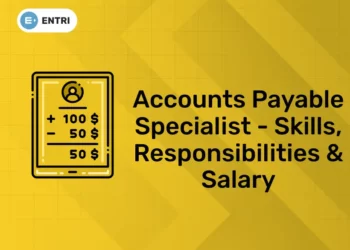Table of Contents
TNPSC Recruitment 2022: Tamil Nadu Public Service Commission (TNPSC) has released a notification at tnpsc.gov.in for recruitment to the Post of Assistant Professor & Clinical Psychologist in Tamil Nadu. Interested candidates can Apply Online on or before 14-Dec-2022. We are also providing the direct link for TNPSC Assistant Professor Syllabus 2022 pdf download.
| TNPSC Assistant Professor Syllabus | |
| Organization Name | Tamilnadu Public Service Commission (TNPSC) |
| Vacancy | 24 Posts |
| Post Names | Assistant Professor of Psychology – Clinical Psychologist |
| Category | Syllabus |
| Job Location | Tamilnadu |
| Official Site | tnpsc.gov.in |
TNPSC Assistant Professor Syllabus
TNPSC Assistant Professor The job of Assistant Professor & Clinical Psychologist has been announced by the Tamil Nadu Government Staff Selection Commission. This article includes the TNPSC Assistant Professor Syllabus.
Attempt Free Mock Tests for TNPSC Main Exam! Download ENTRI App!
TNPSC Assistant Professor Syllabus 2022
UNIT-I DEVELOPMENTAL PSYCHOLOGY
Prenatal, Infancy, Childhood – Characteristics, Periods, Hazards, Developmental
Tasks. Physical, Cognitive, Social, Emotional, Moral Development
Adolescence – Characteristics, Hazards, Developmental Tasks, Physical, Cognitive,
Social, Emotional, Moral Development
Adulthood – Characteristics, Developmental Tasks, Vocational & Marital Adjustment,
Hazards, Physical, Emotional and Social Changes.
Middle age – Characteristics, Developmental Tasks, Vocational & Marital Adjustment,
Hazards, Physical, Emotional and Social Changes.
Old age – Characteristics, Developmental Tasks, Hazards, Physical, Emotional and
Social Changes, Graceful Aging and Death and Adjustments.
UNIT II : PERSONALITY : THEORIES AND APPLICATIONS
Personality – Definition, Levels of Personality Analysis, Sources of Personality Data,
Role of Personality Theory, Personality Assessments
Approaches – Psychodynamic, Dispositional, Biological, Intra-psychic, Cognitive,
Experiential, Social and Cultural. Eastern Perspective – Yoga and Hindu Tradition, Zen
Buddhism, Sufism and Islamic Tradition. Applications of Various approaches of
Personality.
UNIT-III – BIO PSYCHOLOGY
Introduction to Neuron and Nervous System – Brain and its functions – Endocrine
Glands – Characteristics, Major Endocrine glands, Hormone Characteristics and
Functions. State of Consciousness. Physiology of Motivation and Emotions. Research
Methods in Biopsychology.
UNIT-IV – COGNITIVE PSYCHOLOGY
Cognitive Psychology – Nature, History, Cognitive Neuro Science and Applications –
Perception – Definition, Nature & Theories. Attention – Processing Capacity in
Selective Attention, Models of Selective Attention. Pattern Recognition and
Consciousness. Memory Structure and Processes – Types and Processes of Memory,
Theories of neurocognition. Mental Representation – Models, Mental Imagery – and
Cognitive Psychology, Cognitive maps, Storing and Retrieval, Theories of retrieval,
Forgetting, Cognitive Development – Life Span Development and Theories.
UNIT V: ADVANCED SOCIAL PSYCHOLOGY
Social Psychology – Definition, Perspectives, Social Perception, Social Cognition,
Attitudes, Social Identity, Prejudice – Causes and Effects. Interpersonal Attraction –
Close relationships, Social Influence, Pro Social Behaviour, Aggression – Nature,
cause and control, Groups and Individual behaviour. Social Psychology in Action.
UNIT VI – HEALTH PSYCHOLOGY Health Psychology – Definition & Scope. Historical Perspective on health & healing.
Factors influencing Health. General approaches to health – Models and theories of
health, Psychological approaches to health. Health enhancing behavior – Eating
behavior & health, Maintaining healthy weight, Healthy relationships – Sexuality,
Intimacy, Communication, Anger.
Health compromising behaviour- Smoking –Tobacco and its biological & psychological
effects, Tobacco related damage to health, quitting smoking and related therapies.
Alcohol – biological and social effects, use and abuse, interventions for alcoholism.
Stress and Coping – Types of stressors, Theories of stress, types of coping, stress
management techniques. Cardiovascular Disease, Psychoneuroimmunology.
UNIT-VII : PSYCHOPATHOLOGY
Mental disorders – Models, Diagnostic classification system. Theoretical Approaches of
Psychopathology. Assessment – Clinical interviews, MSE, MMSE, Case history, Clinical
observations. Tests- Intelligence, Neuropsychological testing, Developmental and
Educational testing – Organic disorders – Disorders of childhood and adolescence,
Anxiety, Trauma, Stress related and Somatoform disorders, Disorders of adult
personality, gender and behavior – Impulse control disorder, Substance use and
addictive disorder, Sexual dysfunctions, Mood- Disorder, Schizophrenia and other
psychotic disorders. Ethics in clinical practice.
UNIT VIII: ORGANIZATIONAL BEHAVIOR AND HUMAN RESOURCE
MANAGEMENT
Organizational Behaviour- Definition, Nature & scope, Approaches. Perception,
Attitude, Learning, Attribution, Motivation – Definition, theories and applications in
organizations. Communication, Leadership and theories, Change process. Group and
Teams, Conflict process, Power and politics.
Human Resource Management – Definition, Nature and Scope, Human Resource
Planning, Job Analysis, Recruitment, Selection and Placement Compensation,
Performance and Management, Training and Development, Grievance, Discipline and
Risk Management, Recent Trends in Human Resource Practices.
UNIT-IX: COUNSELING AND THERAPY
Counseling – Origin, Scope and Structure – Steps in Counseling – Factors affecting
counseling process, Skills for an effective counselor – Factors of Counselee – Early
Theories of Counseling – Contemporary Theories of Counseling, Individual
Counseling – Nature, Process and Benefits, Group Counseling – Nature, Scope and
Limitations – School Counseling – Nature Role of Teacher, School Counsellor,
Counseling and School Curriculum, Vocational Counseling – Theories, Process,
Counseling in Specific areas – Family, Marriage, Women, Weaker Section, drug
addicts, Delinquents – Review of Counseling – Counseling Evaluation , Monitoring,
Evaluation – Approaches, Types, Techniques.
UNIT-X : RESEARCH METHODOLOGY
Research – Objectives, Types, Significance, Steps in research process, Ethics in
Research.
Research problem – Review of literature, Measurement, Variables and Hypothesis,
Sampling techniques – Non experimental Method – Observational Research,
Interviewing, Focus groups, Survey, Case study. Experimental Method – Single factor
design, Factorial Design, Standardization of psychological test. Parametric and Non-Parametric statistics. Qualitative Research Methods and analysis. Reporting research
in psychology.
Paper-II
SYLLABUS FOR EXAMINATION (CBT Method)
PART – A
TAMIL ELIGIBILITY TEST (SSLC STANDARD)
- Extraction/Addition.
- Picking up antonyms.
- Finding an Unmatched Word
- ERROR CORRECTION (i) Eliminating inconsistency (ii) Eliminating grammatical errors, slips of the tongue Eliminating idioms
- Knowing the Tamil equivalent of the English word.
- Differentiate between sound and meaning and know the correct meaning.
- Multiple words that give one meaning.
- Choosing a root word.
- Forming adverbs, adjectives, adverbs and nouns from the root
- Arrange words alphabetically.
- Arrange words and make sentences.
- Distinguish the meaning of two verbs (eg accumulate and concentrate).
- Selecting Answered Question.
- Identifying the type of sentence – Identifying subject, object, action and action verbs.
- Select and write an appropriate meaning illustrated by a simile
- Vocabulary
- Answer types
- Finding Tamil equivalents of foreign words (eg goldbiscuit-thangakatti)
- Write the suffix of place names (eg) Thanjavur-Tanjai
- Knowing punctuation marks
- colloquial, written case waran-coming).
- Creating new words by combining words
- Appropriate tense setting (past, present, future).
- Choose the correct question word
- Correct conjunction (so, because, therefore, so, so).
- Add the word in brackets in the appropriate place.
- Ambiguity.
- Change of sign, meaning difference
- Is the statement correct? Is it wrong?
- Knowing the terminology eg- Artificial Intelligence – Super Computer
- Choosing the right material
- Compound nouns of words (eg) grass are grasses
- Choosing the right series
- Debugging a.or)
- Match word-object
- Singular-plural error
- Choose the correct answer to the question from the passage
Paper-II
PART – B
GENERAL STUDIES (DEGREE STANDARD)
CODE NO.003
UNIT-I: GENERAL SCIENCE
(i) Scientific Knowledge and Scientific Temper – Power of Reasoning – Rote
Learning vs Conceptual Learning – Science as a tool to understand the
past, present and future.
(ii) Nature of Universe – General Scientific Laws – Mechanics – Properties of
Matter, Force, Motion and Energy – Everyday application of the Basic
Principles of Mechanics, Electricity and Magnetism, Light, Sound, Heat,
Nuclear Physics, Laser, Electronics and Communications .
(iii) Elements and Compounds, Acids, Bases, Salts, Petroleum Products,
Fertilisers, Pesticides.
(iv) Main concepts of Life Science, Classification of Living Organisms,
Evolution, Genetics, Physiology, Nutrition, Health and Hygiene, Human
Diseases.
(v) Environment and Ecology.
UNIT-II: CURRENT EVENTS
(i) History – Latest diary of events – National symbols – Profile of States –
Eminent personalities and places in news – Sports-Books and authors.
(ii) Polity – Political parties and political system in India-Public awareness
and General administration- Welfare oriented Government schemes and
their utility, Problems in Public Delivery Systems.
(iii) Geography-Geographical landmarks.
(iv) Economics-Current socio-economic issues.
(v) Science-Latest inventions in Science and Technology.
(vi) Prominent Personalities in various spheres – Arts, Science, Literature
and Philosophy.
UNIT-III: GEOGRAPHY OF INDIA
(i) Location – Physical features – Monsoon, Rainfall, Weather and Climate –
Water Resources – Rivers in India – Soil, Minerals and Natural
Resources – Forest and Wildlife – Agricultural pattern.
(ii) Transport-Communication.
(iii) Social Geography – Population density and distribution – Racial,
Linguistic Groups and Major Tribes.
(iv) Natural calamity – Disaster Management – Environmental pollution:
Reasons and preventive measures – Climate change – Green energy.
UNIT–IV: HISTORY AND CULTURE OF INDIA
(i) Indus Valley Civilization – Guptas, Delhi Sultans, Mughals and Marathas
– Age of Vijayanagaram and Bahmani Kingdoms – South Indian History.
(ii) Change and Continuity in the Socio – Cultural History of India.
(iii) Characteristics of Indian Culture, Unity in Diversity – Race, Language,
Custom.
(iv) India as a Secular State, Social Harmony.
UNIT-V: INDIAN POLITY
(i) Constitution of India – Preamble to the Constitution- Salient features of
the Constitution- Union, State and Union Territory.
(ii) Citizenship, Fundamental Rights, Fundamental Duties, Directive
Principles of State Policy.
(iii) Union Executive, Union Legislature – State Executive, State
Legislature – Local Governments, Panchayat Raj.
(iv) Spirit of Federalism: Centre-State Relationships.
(v) Election – Judiciary in India – Rule of Law.
(vi) Corruption in Public Life – Anti-corruption measures – Lokpal and Lok
Ayukta – Right to Information- Empowerment of Women-Consumer
Protection Forums, Human Rights Charter.
UNIT-VI: INDIAN ECONOMY
(i) Nature of Indian Economy – Five year plan models – an assessment –
Planning Commission and Niti Ayog.
(ii) Sources of revenue – Reserve Bank of India – Fiscal Policy and
Monetary Policy – Finance Commission – Resource sharing between
Union and State Governments – Goods and Services Tax.
(iii) Structure of Indian Economy and Employment Generation, Land
Reforms and Agriculture – Application of Science and Technology in
Agriculture – Industrial growth – Rural Welfare Oriented Programs
– Social Problems – Population, Education, Health, Employment,
Poverty.
UNIT-VII: INDIAN NATIONAL MOVEMENT
(i) National Renaissance –Early uprising against British rule – Indian
National Congress – Emergence of leaders –BRAmbedkar, Bhagat
Singh, Bharathiar, VO Chidambaranar Jawaharlal Nehru, Kamarajar,
Mahatma Gandhi, Maulana Abul Kalam Azad, Thanthai Periyar, Rajaji,
Subash Chandra Bose , Rabindranath Tagore and others.
(ii) Different modes of Agitation: Growth of Satyagraha and Militant
Movements.
(iii) Communalism and Partition.
UNIT-VIII: History, Culture, Heritage and Socio-Political Movements
in Tamil Nadu
(i) History of Tamil Society, related Archaeological discoveries, Tamil
Literature from Sangam Age till contemporary times.
(ii) Thirukkural : (a) Significance as a Secular Literature
(b) Relevance to Everyday Life
(c) Impact of Thirukkural on Humanity
(d) Thirukkural and Universal Values – Equality,
Humanism, etc
(e) Relevance to Socio-Politico- Economic affairs
(f) Philosophical content in Thirukkural
(iii) Role of Tamil Nadu in freedom struggle – Early agitations against
British Rule – Role of women in freedom struggle.
(iv) Evolution of 19th and 20th Century Socio – Political Movements in Tamil
Nadu – Justice Party, Growth of Rationalism – Self Respect Movement,
Dravidian Movement and Principles underlying both these Movements,
Contributions of Thanthai Periyar and Perarignar Anna.
UNIT–IX: Development Administration in Tamil Nadu
(i) Human Development Indicators in Tamil Nadu and a comparative
assessment across the Country – Impact of Social Reform Movements
in the Socio – Economic Development of Tamil Nadu.
(ii) Political parties and Welfare schemes for various sections of people –
Rationale behind Reservation Policy and access to Social Resources –
Economic trends in Tamil Nadu – Role and impact of social welfare
schemes in the Socio-Economic Development of Tamil Nadu.
(iii) Social Justice and Social Harmony as the Cornerstones of SocioEconomic Development.
(iv) Education and Health Systems in Tamil Nadu.
(v) Geography of Tamil Nadu and its impact on economic growth.
(vi) Achievements of Tamil Nadu in various fields.
(vii) e-Governance in Tamil Nadu.
UNIT-X: APTITUDE AND MENTAL ABILITY
(i) Simplification – Percentage – Highest Common Factor (HCF) – Lowest
Common Multiple (LCM).
(ii) Ratio and Proportion.
(iii) Simple interest – Compound interest – Area – Volume – Time and
Work.
(iv) Logical Reasoning – Puzzles-Dice – Visual Reasoning – Alpha numeric
Reasoning – Number Series.
TNPSC Assistant Professor Syllabus 2022 Download PDF
A notification for the position of Assistant Professor of Psychology and Clinical Psychologist has been released by TNPSC. In order to fill the positions of Assistant Professor of Psychology and Clinical Psychologist in the Tamil Nadu Medical Service, direct recruitment applications are being accepted from qualified candidates solely through the online application process till 14.12.2022. To get the TNPSC Assistant Professor Syllabus, click the link below.
Download TNPSC Assistant Professor of Psychology 2022 Syllabus
TNPSC Assistant Professor Exam Pattern
| Subject
EXAMINATION in COMPUTER BASED TEST METHOD
|
Duration | Maximum Marks | Minimum qualifying marks for selection | |
| SCs, SC(A)s, STs,
MBCs/ DCs, BC(OBCM)s & BCMs |
Others | |||
| (i) Paper I Subject Paper Psychology (PG Degree standard) (Code No.372 ) – 200 Questions |
3 Hours | 300 | 153
|
204
|
| (ii) Paper II (Total 200 questions) Part-A Tamil Eligibility Test * (SSLC Std) (100 questions/ 150 marks) |
1.30 Hrs
1.30 hrs |
Note: Minimum qualifying marks –60 marks (40% of 150) Marks secured in Part-A of Paper-II will not be taken into account for ranking. |
||
| Part-B (General Studies) (Code No.003) (100 questions/ 150 marks) General Studies (Degree Std) -75 questions and Aptitude & Mental Ability Test (SSLC Std.) -25 questions(iii) Interview and Records |
150
60 |
|||
| Total | 510 | |||
Attempt Free Mock Tests for TNPSC Main Exam! Download ENTRI App!













